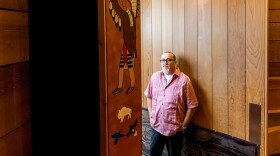Editor's Note: We're taking a closer look at Washington's tax system through a week-long series. This is the second installment of “Where’s the Dough? On the Hunt for Washington’s Missing Tax Dollars." Our first installment explored the history of the state's tax system.
When she was in the legislature, the giant wooden table in Marilyn Rasmussen's kitchen — the one with the lazy susan big enough to comfortably serve the seven kids she raised here — used to swarm with farmers wanting to talk shop.
"This table always had people around it, always talking about ideas. 'What are our problems? How can we solve 'em?'" the former lawmaker, 76, remembered as she warmed her hand over a hot cup of coffee. "Farmers are really good at solving issues."
Rasmussen, the top Democrat on the Senate agriculture committee for 16 years, made it her business to solve them, too.
Back in January 2001, for instance, the issue was propane. Prices for the fuel had spiked 225 percent over two years. In Rasmussen's rural Pierce County district, that was a problem for one group in particular: poultry farmers. The 60 or 70 farmers in Washington producing most of the state's 33 million chickens were feeling the squeeze.

Farmers who raise chickens for their meat spend perhaps a third of their budget simply keeping their barns at tropically-warm temperatures. The fuel is expensive, but a farmer trying to save on her heating bill by lowering the thermostat could stunt her flock's growth and reduce the prices each bird command at slaughter.
So in February 2001, Rasmussen acted, using the only means she says she had to ensure "we could keep our farmers making a profit — or at least to break even": She created a tax exemption.
'Tax Exemption — Is That A Nasty Word?'
Washington state's tax break for chicken barn heating fuel highlights a lot of what's complicated — and controversial — about a state tax system that's often criticized as outmoded or unfair to the poor.
In 1915, there were 20 tax exemptions on Washington's books. By 1935, there were nearly 80. Now, there are more than 600, roughly 450 of which would generate some revenue for the state if repealed, according to state revenue officials. (See a visual breakdown of these exemptions here.)
To those who favor an overhaul of the state's tax system, the proliferation of tax breaks on its own is a problem. The state's tax code, they say, has become backlogged with special favors to those connected enough to bend lawmakers' ears or wealthy enough to at least sway their votes.
But defenders of the system say the thick web of exemptions represents a genuine effort to correct the system's most basic problems and relieve its unfair burdens for consumers, businesses and, yes, farmers.

"When you say 'tax exemption,' is that a nasty word?" said Rasmussen, who sponsored 21 bills that would ultimately turn into tax breaks for agriculture during her time in Olympia.
"It doesn't sound nasty when Boeing gets it, or when Intel gets it, or when attorneys get it ... That doesn't sound bad, does it?" Rasmussen added. "But if you turn around and so, 'Oh, that poor little chicken farmer, he's getting that tax exemption. He's not so poor.' You've got to figure it out — his margin of how much money he's going to make is minute."
'I Don't Desire To Own Chickens ... But I Support This Bill'
The moment of the chicken barn tax break's birth still exists in the form of crackly audio of a state legislative committee hearing from 2001.
That year, Rasmussen was the first lawmaker to sponsor legislation exempting heating fuel for chicken barns from sales or utility taxes. As chair of the Senate agriculture committee that year, she held a public hearing on her proposal, Senate Bill 5498, on February 2, 2001. Two fryer producers — chickens raised for their meat are often called "fryers" or "broilers" — testified.
"In order for us to expand, we need some relief in some area in order to expand to make it cost-effective," said Tenino farmer Roger Reeves.
Lobbyists for the Washington State Farm Bureau and the now-defunct Washington Fryer Commission both testified. Then dairy farmer Fred Colvin took the mic.
"I do not own any chickens, and frankly, I do not desire to own any chickens. However, I fully support this bill,” Colvin said. “I think it’s important that sometime we look at the whole issue of sales taxes on direct inputs into agriculture production."
Rasmussen's bill was eventually folded into House Bill 2138, a broader package of agriculture tax breaks. That bill won the unanimous support of the state House and all but two votes in the Senate.
Tax Breaks Help Farmers 'Remain Competitive'
Colvin's argument about "inputs" refers to a common argument economists make: It's a bad idea to tax something businesses buy in the process of making a final product. Since propane is an input to growing chickens, the argument goes, heating fuel ought to be exempt from taxes.
As the business-backed Washington Research Council puts it, tax exemptions "reduce distortions in the tax system and thereby level the playing field."
But Tom Davis, director of government relations for the Washington State Farm Bureau, says exempting inputs from taxes is about more than economic fairness for farmers. A farm's margins are tight, he says, but input prices are often beyond a farmers' control.
"To remain competitive both with other states and other countries, the legislature has provided these tax incentives to help keep their costs down," Davis said. "Fertilizers, for example, keep going up in cost and yet the value of the price that they can sell their product for, say, wheat— we don't set that price. That's set for us on an international market."
'Favors To The Best Lobbyists'

But there’s another way to look at tax exemptions — that they aren’t leveling the playing field at all.
"These are more just favors to the best lobbyists," said John Burbank, executive director of the left-leaning Economic Opportunity Institute. "These tax exemptions and expenditures are pretty much hidden. They're not part of the public discussion."
Burbank's argument doesn't come exclusively from the left.
Jason Mercier, director of the Center for Government Reform at the right-leaning Washington Policy Center, makes a similar argument. Though he doesn't favor creating an income tax as Burbank does, he does believe Washington's tax system is long overdue for a total overhaul.
Instead of 600-plus exemptions to correct problems in the tax code, Mercier says the state is better off creating a system that taxes businesses in a more standardized way.
"We're providing relief from this distortion business by business, industry by industry, lobbyist by lobbyist instead of looking at it from a standpoint of realizing that if this distortion is happening, it's happening across the state's economy," Mercier said.
"We'd like to remove, basically, tax relief by lobbyist," Mercier added, "and instead have it be just that uniform rate where if we're deciding those rates are too high, it gets lowered for everybody and not just the one that has the best lobbyist."
A 'More Practical Solution'?
Washington's 600 exemptions save taxpayers — and likely cost the state — more than $12 billion a year in revenues. But nearly $11 billion of that impact comes from the 25 biggest exemptions alone: tax breaks for everything from building airplanes to trading in cars, to buying food, fuel or prescription drugs.
On the other end of the spectrum is the chicken barn heating fuel exemption and its estimated fiscal impact of $1.1 million a year. It's one of nearly 350 exemptions that each save taxpayers less than $5 million a year. In total, these 350 likely cost the state around $211 million a year.
The need for hundreds of millions of additional dollars for K-12 education, as mandated by the State Supreme Court's McCleary decision, has made exemptions tempting targets.
During oral arguments in the case in September, state Supreme Court Justice Charles Johnson even floated the idea of the court invalidating all 600-plus tax breaks, "leaving it up to the legislature to reenact each and every one of them, if they so choose, but only after they fully fund the primary responsibility this court has already established."
"I see that as a more practical solution than sometime after the legislature fails or ends its session for the parties to come back and asking us to invalidate the budget," Johnson said.
'If Someone Called You, That Makes A Huge Difference'

Despite a bad eye, a bad left leg and a bad right knee, the dairy farmer in Marilyn Rasmussen won't quit. She still gets up on her tractor (she calls it "Jane Deere") and bales hay, despite her grandkids' best efforts to hide her keys. She still keeps a few cows on her hundred acres, though far fewer than the 117 she had in the '90s.
Not far from where she parks Jane Deere, old campaign signs sit in a heap. Rasmussen says she does miss working in the legislature.
"I always thought politics was people anyway," she said. "I was never ashamed of going into the legislature. I thought that's just an expansion of doing the people's business."
As a state lawmaker, she says tax breaks were perhaps the only tool at her disposal to help her constituents financially — and she isn't so certain that lobbyists have as much influence in creating them as outsiders estimate.
Lobbyists did bring her ideas, but she's also plugged into her community; she heard ideas for legislation at Future Farmers of America meetings and high school sporting events.
"You get thousands of letters that are copies of what some lobbyist told them to the write. Even to go as far as print it out for them and all you have to do is sign their name. That kind of thing happens all the time," Rasmussen said. "But if someone called you, sent you a written note and said, ‘Hey, this is how it affects me,’ that makes a huge difference.”
That’s just how Rasmussen felt anyway. But she adds a caveat: She's not certain she can say the same for all of her colleagues' votes, especially when the political stakes of an issue are high.
In the next installment in our series, we'll do the math behind the tax incentives Washington state lawmakers approved for Boeing.







